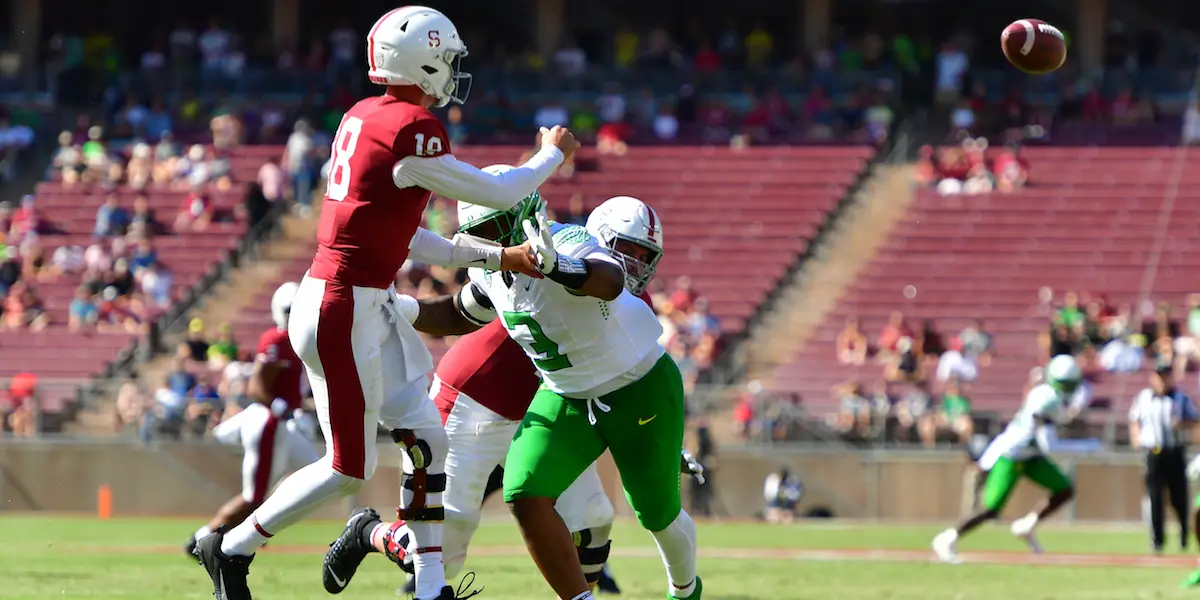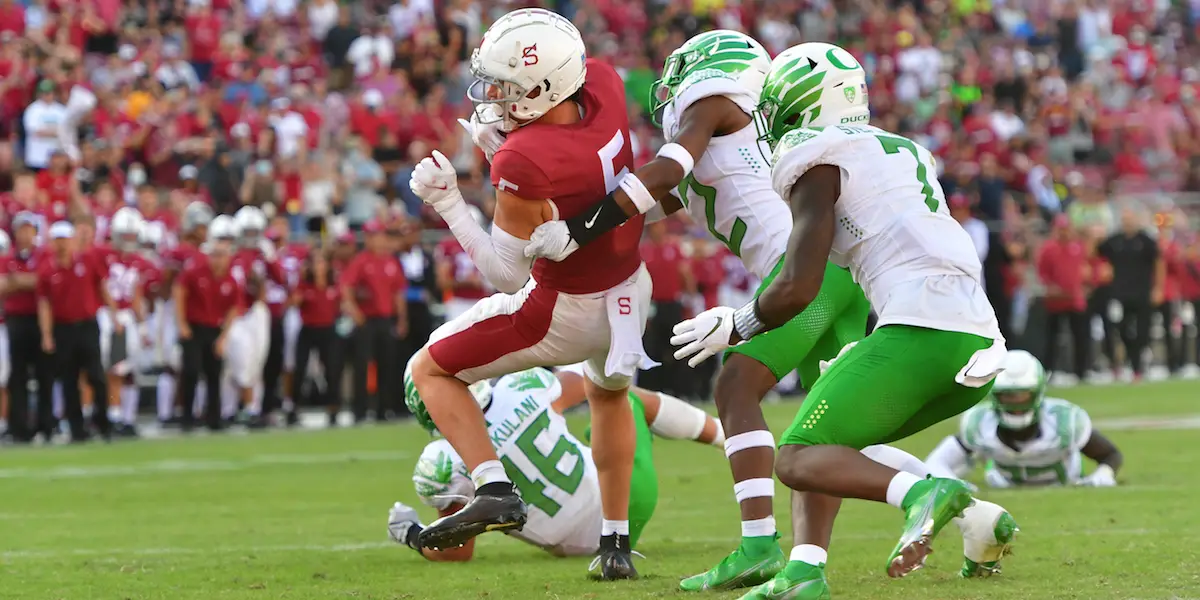Targeting penalties are ruining college football. These well-intentioned fouls have sucked the enjoyment out of the game. The penalty is too subjective, punishment too harsh. Something’s gotta change.
Every team has experienced a questionable targeting call. Last week, the No. 8 Oregon Ducks had two targeting penalties in their loss to the unranked Stanford Cardinal, including one joy-killing penalty during the opening kickoff against cornerback Trikweze Bridges.
The second targeting call late in the game against star defensive end Kayvon Thibodeaux, who appeared to be pushed from behind (blocked in the back?) by an offensive lineman, making incidental and minimal (in my humble opinion) helmet-to-helmet contact with Stanford quarterback Tanner McKee.

Kayvon Thibodeaux was called for targeting on Stanford QB Tanner McKee late in the fourth quarter of last week’s game.
Whatever you think about the call, the Ducks were doomed. Thibodeaux was ejected from the game and Stanford received a fresh set of downs. More questionable penalties soon followed, including roughing the passer and pass interference, a very questionable penalty as time expired that gave Stanford an extra play to tie the game and send it to overtime.
Look, I’ll cut to the quick. I understand the danger of hitting a defenseless player in the head. I don’t want anybody to get hurt. EVER. But that’s Pollyanna thinking in football. It’s a violent sport. Just ask the Cardinal receiver whose foot was bent 180 degrees in the wrong direction and left the game on a golf cart. It’s doubtful he will ever play football again, let alone walk freely on that leg. That’s devastating and horrific. And it’s an unfortunate reality. Hits happen and helmets collide.
——————————
The Our Beloved Ducks Forum is BACK! Come get the links to Oregon Sports articles, the press releases from the Oregon Athletic Department and the news from your fellow Duck fans. It is the only safe place on the web for Duck Discussion, so join us over there!
——————————
Targeting calls should be rare and based chiefly on a player’s intent. Here’s the rule: According to the 2019 NCAA rule book, targeting occurs when a player “takes aim at an opponent for the purposes of attacking with forcible contact that goes beyond making a legal tackle or legal block or playing the ball.”
Basically, did the player lead with the crown of the helmet in order to intentionally make contact with his opponent’s head? Some might argue that determining a player’s intent is nearly impossible. EXACTLY! Actual targeting is egregious, obvious and flagrant, not subtle, subjective and willy-nilly.
College Football players should be able to sue the NCAA when they are ejected for playing football
TJ Carter. Great hit. Awful awful awful targeting call.
— The Transfer Portal CFB (@TPortalCFB) October 2, 2021
And to make things worse, players convicted of these corporal offenses are ejected from the game with a mandatory half-game suspension because some knuckle-dragging ref probably owed his bookie back payments. But seriously, there is a glaring consistency problem when making targeting determinations.
Chris Goforth, a radio play-by-play announcer, summed up the problem perfectly: “The problem with targeting, to me, is the way it’s officiated,” Goforth said. “This rule is wide open for interpretation and so there’s no consistency from crew to crew or game to game, even tackle to tackle sometimes… “
Officials should only call targeting for players clearly trying to brain other players by using their helmets as battering rams. But flagging a player for minimal and/or accidental contact in a close game? Seriously? We don’t need a penalty for every fart and cough on the field. LET THEM PLAY. Stop inserting this bogus, hypersensitive interpretation of the targeting rule into the game. And it’s only getting worse.
Earlier this month during a matchup between Ole Miss and Louisville, four targeting penalties resulting in four ejections BEFORE HALFTIME.
4 players were ejected in the first half of the Louisville-Ole Miss game for targeting. pic.twitter.com/n8XelF2utl
— CBS Sports (@CBSSports) September 7, 2021
Over the years, targeting calls have only increased since they were first implemented in 2013. According to a former referee and rules expert Terry McAulay, the targeting penalty was introduced in college football in response to pressure from Congress to curtail concussions, head and neck injuries in football.
The rules changed in 2016 when officials implemented instant replay to review targeting decisions. In 2019, the NCAA passed a “three strikes” rule that calls for a full-game suspension for a player who has three targeting fouls in the same season.
According to Sports Illustrated, during the first three weeks of the 2021 season, officials called targeting 105 times and 45 of those were overturned on replay. 60 targeting fouls were enforced in 243 games, or one targeting call every four games (.25). Those numbers are similar to the previous year’s rate (0.27), which featured the highest targeting rate since at least 2016 when there was a targeting foul enforced in about every six games (0.17).”
The goal of safety is a noble one. But at what expense? At this rate, football will soon consist of guys hugging each other and exchanging compliments.
Jordan Ingram
San Diego, California
Top Photo by Tom Corno
Come join us in the new Our Beloved Ducks Forum, where you get the news about Oregon Sports and is the safest place on the web to read and post your opinions!

Jordan is a lifelong Duck fan currently living in San Diego. Jordan graduated from The Evergreen State College in Olympia, Washington, after serving a prestigious fellowship with the Washington State House of Representatives. Upon graduation, he worked as an English language teaching assistant for the Spanish Ministry of Education’s Ambassadorial Program in Monforte de Lemos, Spain. Jordan has worked as a journalist, writer, and editor in Oregon, Washington, Montana, and California, covering a wide range of topics, including sports, local politics, and crime. He is VERY excited to be writing about his beloved Oregon Ducks.


